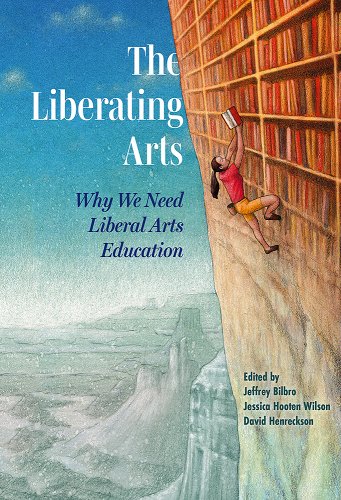Buy the book from Plough | Bookshop | Amazon
The Liberating Arts: Why We Need Liberal Arts Education. Edited by Jeffrey Bilbro, David Henreckson, and Jessica Hooten Wilson.
Contributors include Emily Auerbach, Nathan Beacom, Jeffrey Bilbro, Joseph Clair, Margarita Mooney Clayton, Lydia Dugdale, Brad East, Don Eben, Becky L. Eggimann, Rachel Griffis, David Henreckson, Zena Hitz, David Hsu, L. Gregory Jones, Brandon McCoy, Peter Mommsen, Angel Adams Parham, Steve Prince, John Mark Reynolds, Erin Shaw, Anne Snyder, Sean Sword, Noah Toly, Johnathan Tran, and Jessica
Hooten Wilson.
Description
You can watch the panel discussion from the book launch (with Roosevelt Montás, Zena Hitz, Jonathan Tran, and Jessica Hooten Wilson) and read my brief reflections on the book project.
A new generation of teachers envisions a liberal arts education that is good for everyone. Why would anyone study the liberal arts? It’s no secret that the liberal arts have fallen out of favor and are struggling to prove their relevance. The cost of college pushes students to majors and degrees with more obvious career
outcomes.
A new cohort of educators isn’t taking this lying down. They realize they need to reimagine and rearticulate what a liberal arts education is for, and what it might look like in today’s world. In this book, they make an honest reckoning with the history and current state of the liberal arts.
You may have heard – or asked – some of these questions
yourself:
Aren’t the liberal arts a waste of time? How will reading old books and discussing abstract ideas help us feed the hungry, liberate the oppressed and reverse climate change? Actually, we first need to understand what we mean by truth, the good life, and justice.
Aren’t the liberal arts racist? The “great books” are mostly by
privileged dead white males. Despite these objections, for centuries
the liberal arts have been a resource for those working for a better
world. Here’s how we can benefit from ancient voices while expanding the conversation.
Aren’t the liberal arts liberal? Aren’t humanities professors mostly
progressive ideologues who indoctrinate students? In fact, the liberal arts are an age-old tradition of moral formation, teaching people to think for themselves and learn from other perspectives.
Aren’t the liberal arts elitist? Hasn’t humanities education too often
excluded poor people and minorities? While that has sometime been
the case, these educators map out well-proven ways to include people of all social and educational backgrounds.
Aren’t the liberal arts a bad career investment? I really just want to
get a well-paying job and not end up as an overeducated barista. The numbers – and the people hiring – tell a different story.
In this book, educators mount a vigorous defense of the humanist tradition, but also chart a path forward, building on their tradition’s strengths and addressing its failures. In each chapter, dispatches from innovators describe concrete ways this is being put into practice, showing that the liberal arts are not only viable today, but vital to our future.
Reviews and Interviews
Jennifer A. Frey reviewed the book at the Wall Street Journal.
Shirley A. Mullen reviewed the book at Current.
Alex Sosler reviewed the book at Front Porch Republic.
Jeffrey Polet reviewed the book at Religion and Liberty.
Jesse Hake reviewed the book at Classical Ed Review.
Darrell Falconburg reviewed the book at Voegelin View.
Nora Kenney reviewed the book at City Journal.
Jason Jewell discusses the book in a series of posts at The Lifelong Learner.
Gil Stafford reviewed the book at Englewood Review of Books.
Peter Kerry Powers reviewed the book at Christian Scholar’s Review.
Carl Blumenthal reviewed the book at Friends Journal.
Laurie Johnson interviewed me about the book for Political Philosophy.
Nathan Gilmour interviewed Davey Henreckson and me about the project for Christian Humanist Profiles.
